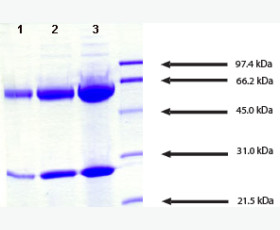Recombinant Human C-C Motif Chemokine 2/CCL2/MCP-1
| Product name: | Recombinant Human C-C Motif Chemokine 2/CCL2/MCP-1 |
| Source: | E.coli |
| Purity: | Greater than 95% as determined by reducing SDS-PAGE. |
| Buffer Formulation: | Lyophilized from a 0.2 μm filtered solution of 20mM PB, 150mM NaCl, pH7.4. |
| Applications: | Applications:SDS-PAGE; WB; ELISA; IP. |
| Storage: | Avoid repeated freeze/thaw cycles. Store at 2-8 oC for one month. Aliquot and store at -80 oC for 12 months. |
| UOM: | 100ug/50ug/200ug/1mg/1g |
| Source | E.coli |
| Description | Recombinant Human C-C Motif Chemokine 2 is produced by our E.coli expression system and the target gene encoding Gln24-Thr99 is expressed. |
| Names | C-C motif chemokine 2, HC11, Monocyte chemoattractant protein 1, Monocyte chemotactic and activating factor, MCAF, Monocyte chemotactic protein 1, MCP-1, Monocyte secretory protein JE, Small-inducible cytokine A2, CCL2 |
| Accession # | P13500 |
| Formulation | Lyophilized from a 0.2 μm filtered solution of 20mM PB, 150mM NaCl, pH7.4. |
| Shipping |
The product is shipped at ambient temperature. |
| Reconstitution |
Always centrifuge tubes before opening. Do not mix by vortex or pipetting. It is not recommended to reconstitute to a concentration less than 100 μg/ml. Dissolve the lyophilized protein in ddH2O. Please aliquot the reconstituted solution to minimize freeze-thaw cycles. |
| Storage |
Lyophilized protein should be stored at < -20°C, though stable at room temperature for 3 weeks. Reconstituted protein solution can be stored at 4-7°C for 2-7 days. Aliquots of reconstituted samples are stable at < -20°C for 3 months. |
| Purity |
Greater than 95% as determined by reducing SDS-PAGE. |
| Endotoxin | Less than 0.1 ng/µg (1 IEU/µg) as determined by LAL test. |
| Amino Acid Sequence |
QPDAINAPVTCCYNFTNRKISVQRLASYRRITSSKCPKEAVIFKTIVAKEICADPKQKWVQDSMD HLDKQTQTPKT
|
| Background | The chemokine (C-C motif) ligand 2 (CCL2), also known as monocyte chemoattractant protein (MCP)-1 and small inducible cytokine A2 (SCYA2)), is a small cytokine that belongs to the CC chemokine family responsible for monocyte attraction. Its cognate receptor, CCR2, play a critical role in regulating nociceptive processes during neuropathic pain. Both CCL2 and CCR2 are implicated in induction of autoimmunity. CCL2 recruits monocytes, memory T cells, and dendritic cells to the sites of inflammation produced by either tissue injury or infection. Recently research also showed that CCL2 might be useful as a biomarker of fibrosis as well as a target for therapeutic intervention. |














